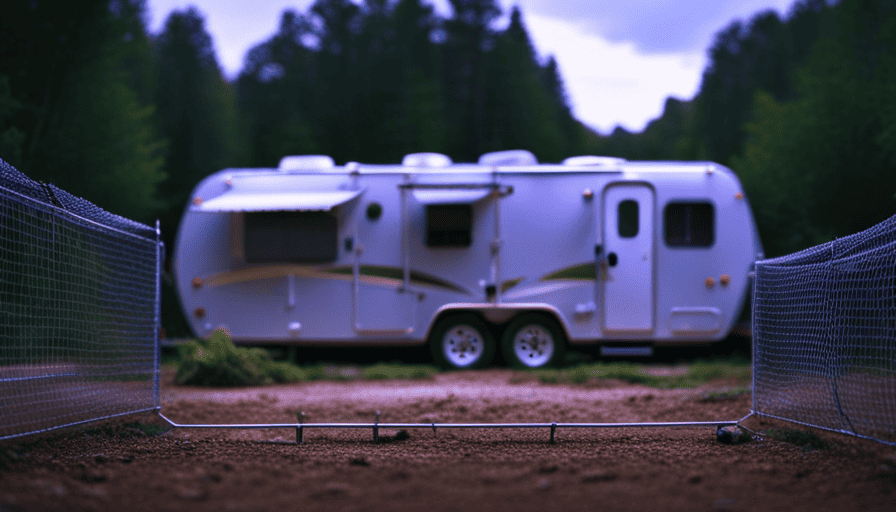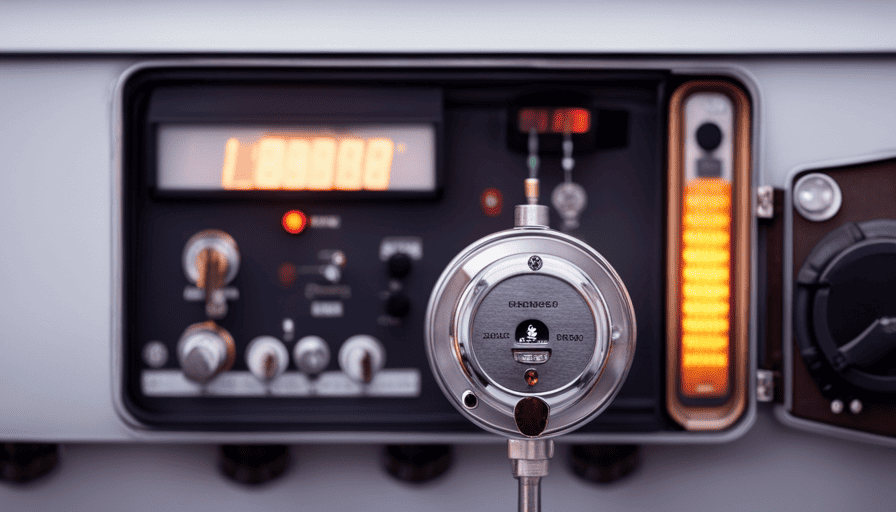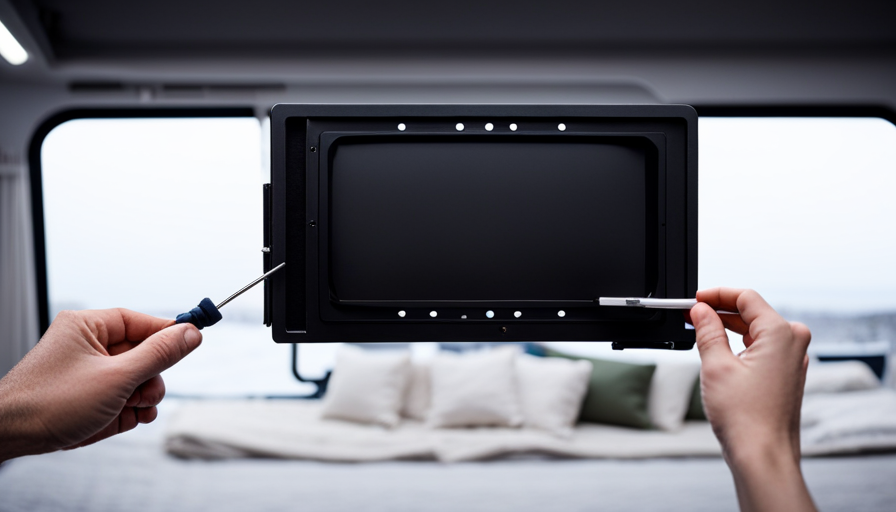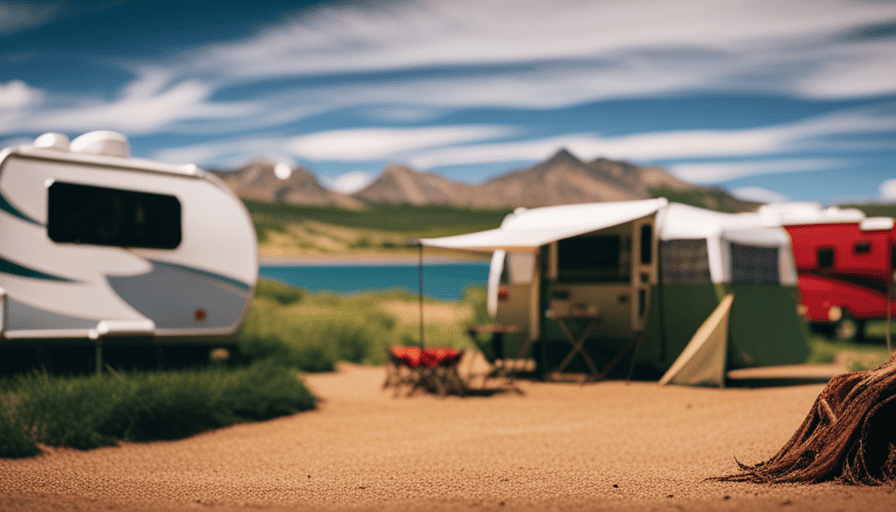Tired of uninvited guests sneaking into your RV? I have the ideal solution for you. In this article, I will share my effective methods for keeping mice and chipmunks out of your camping area. Follow these simple guidelines, and you will enjoy a rodent-free experience.
First and foremost, it is crucial to seal all cracks and openings in your camper. These pesky critters can squeeze through even the tiniest of spaces, so be thorough in your inspection.
Additionally, storing food in airtight containers will help deter them from making their way into your pantry.
Peppermint oil is a natural repellent that mice and chipmunks despise. Simply place a few cotton balls soaked in peppermint oil in strategic areas around your camper to keep them at bay. And for those persistent little intruders, setting up traps and bait stations can be a game-changer.
Keeping your camper clean and free of crumbs is another effective method. Rodents are attracted to food sources, so be diligent in your cleaning routine. Ultrasonic devices can also be used to deter rodents with high-frequency sound waves that are unpleasant to their sensitive ears.
Furthermore, placing mothballs or dryer sheets in strategic areas can repel these unwanted visitors. Their strong scent is a deterrent for mice and chipmunks. Lastly, installing wire mesh around your camper’s exterior will prevent these critters from finding their way in.
Remember, prevention is key. Regularly inspect and maintain your camper for any signs of an infestation. By taking these proactive measures, you can enjoy a rodent-free camping experience and make lasting memories with your loved ones.
Key Takeaways
- Seal cracks and openings in camper
- Use natural deterrents like peppermint oil, cayenne pepper, mothballs, or dryer sheets
- Regularly inspect and maintain camper for signs of infestation
- Store food in airtight containers
Seal all cracks and openings in your camper
Don’t let those pesky critters ruin your camping trip – seal up all cracks and openings in your camper, and keep those mice and chipmunks out for good! When it comes to deterring mice and chipmunks from entering your camper, prevention is key. By creating a natural barrier against rodents, you can ensure a pest-free camping experience without resorting to harmful chemicals.
Start by thoroughly inspecting your camper for any cracks or openings. Check the windows, doors, vents, and any other potential entry points. Use caulk or weatherstripping to seal these gaps, making sure to cover every nook and cranny. Pay special attention to areas where wires or pipes enter your camper, as these are common entry points for rodents.
Additionally, consider using natural deterrents to further discourage mice and chipmunks. These can include placing cotton balls soaked in peppermint oil near entry points, as rodents dislike the strong scent. Another option is to sprinkle cayenne pepper or ammonia around the perimeter of your camper, as these odors are unpleasant to rodents.
By sealing all cracks and openings in your camper and using natural deterrents, you can create a fortress against mice and chipmunks. However, it’s important to take further precautions, such as storing food in airtight containers, to ensure these pesky critters stay away.
Store food in airtight containers
Make sure to store all your food in containers that seal tightly, so those little critters won’t have any chance of finding a snack in your cozy camper! Storing food properly is essential in keeping mice and chipmunks away.
These critters have a keen sense of smell and can easily detect food from a distance. By using airtight containers, you create a barrier that prevents any enticing scents from escaping and attracting unwanted visitors.
When it comes to choosing containers, opt for ones made of durable materials such as glass or hard plastic. Avoid using paper or cardboard packages, as they can be easily chewed through. Additionally, make sure the lids of the containers fit snugly to ensure a proper seal.
Another useful tip to deter mice and chipmunks is to use peppermint oil as a natural repellent. These rodents dislike the strong scent of peppermint and will avoid areas where it is present. Simply soak cotton balls in peppermint oil and place them strategically around your camper, focusing on areas where food is stored. This will help create a barrier and discourage any unwanted visitors from approaching your food supply.
By storing your food in airtight containers and utilizing natural repellents like peppermint oil, you can effectively keep mice and chipmunks out of your camper. Now, let’s move on to the next step of using peppermint oil as a natural repellent.
Use peppermint oil as a natural repellent
Utilizing peppermint oil as a natural repellent adds a refreshing and aromatic layer of protection against unwanted critters in your cozy camper. Not only does it keep mice and chipmunks at bay, but it also leaves your camper smelling minty fresh.
Here are four reasons why peppermint oil is an excellent choice for keeping pests away:
-
Peppermint oil alternatives: While peppermint oil is highly effective, there are other essential oils that can be used as alternatives. Some options include spearmint, eucalyptus, and lavender oil. These oils have similar properties and can be just as effective in repelling pests.
-
Effectiveness of peppermint oil on other pests: Peppermint oil is not only useful against mice and chipmunks but can also deter other pests. It has been found to be effective against ants, spiders, and even mosquitoes. So, by using peppermint oil, you can create a pest-free environment inside your camper.
-
Application methods: To use peppermint oil as a repellent, simply soak cotton balls in the oil and place them strategically around your camper. Focus on entry points such as windows, doors, and vents. Reapply the oil every few weeks or as needed to maintain its effectiveness.
-
Additional benefits: Apart from repelling pests, peppermint oil has additional benefits. It can help alleviate headaches and provide a soothing effect on your senses, creating a calming atmosphere inside your camper.
By incorporating peppermint oil into your pest control routine, you can enjoy a critter-free and pleasant camping experience. Now, let’s move on to the next section and discuss how to set up traps and bait stations to further safeguard your camper.
Set up traps and bait stations
To ensure a critter-free camping experience, it’s time to set up traps and bait stations in order to safeguard your cozy camper. When it comes to trapping techniques, there are a few options to consider.
Snap traps are a common choice and can be effective for catching mice and chipmunks. Simply place them in areas where you’ve noticed activity, such as along walls or near entry points.
Another option is live traps, which allow you to catch the pesky critters without harming them. Once caught, you can release them back into the wild far away from your camper.
Now, let’s talk about effective baits. Peanut butter is a classic choice that tends to attract both mice and chipmunks. Place a small amount on the trigger of the trap to entice the critters. Other options include cheese or even small pieces of fruit. Experiment with different baits to see which works best for your situation.
By setting up traps and bait stations, you’ll be taking proactive steps to keep your camper critter-free. But that’s not the only thing you can do. In the next section, we’ll explore how to keep your camper clean and free of crumbs, which is another important aspect of preventing unwelcome guests.
Keep your camper clean and free of crumbs
Maintaining a tidy camper is like sweeping away the breadcrumbs that can tempt a hungry flock of birds. It’s crucial to keep your camper clean and free of crumbs to deter mice and chipmunks from entering.
Here are some practical tips to achieve this:
-
Proper waste management: Dispose of garbage regularly and securely. Use sealed containers that can’t be easily accessed by rodents. It’s also important to keep your outdoor trash bins away from the camper to minimize the chances of attracting these critters.
-
Keep a designated eating area: Avoid eating inside your camper to prevent food crumbs from accumulating. Instead, designate a specific area outside where you can enjoy your meals. Clean up any food debris immediately to discourage pests from being drawn to your camper.
-
Store food properly: Seal all food items in airtight containers to prevent rodents from smelling and reaching them. Avoid leaving perishable food items exposed, as they can quickly become an irresistible feast for these unwanted guests.
-
Maintain cleanliness: Regularly sweep and vacuum your camper to eliminate any crumbs or food particles that may have been missed. Pay special attention to areas where food is prepared or consumed.
-
Remove any potential nesting materials: Check your camper for any materials that could be used by mice or chipmunks for nesting, such as paper, fabric, or insulation. Remove and replace these items to minimize the chances of infestation.
By following these steps, you can create an inhospitable environment for mice and chipmunks in your camper.
In the next section, we’ll discuss how to remove any potential nesting materials without attracting these pests.
Remove any potential nesting materials
Ensure a cozy and safe haven for yourself by swiftly removing any potential nesting materials that may attract unwanted visitors. Preventive measures are crucial in keeping mice and chipmunks away from your camper. These pests are attracted to materials that can serve as nesting spots, such as cloth, paper, and cardboard. To effectively deter them, it’s essential to keep your camper clutter-free and tidy. Regularly inspect and clean all storage areas, ensuring that no piles of clothing or bedding are left unattended.
In addition to removing potential nesting materials, employing pest control methods can further prevent infestations. Seal any holes or gaps in your camper’s exterior, as rodents can squeeze through even the smallest openings. Ensure that windows and doors are properly sealed to prevent easy access. Implementing a thorough cleaning routine after meals and snacks is also essential. Wipe down surfaces, sweep the floors, and dispose of any food scraps promptly.
By taking these preventive measures and implementing pest control methods, you can minimize the risk of mice and chipmunks making a home in your camper. In the next section, we’ll explore how ultrasonic devices can be used to deter these persistent rodents. Transitioning into this topic, it’s important to consider all available options for keeping your camper rodent-free.
Use ultrasonic devices to deter rodents
After removing any potential nesting materials from your camper, it’s important to take additional steps to keep mice and chipmunks away. One effective method is to use ultrasonic devices specifically designed to deter rodents. These devices emit high-frequency sound waves that are unpleasant to rodents, causing them to stay away from the area.
-
Ultrasonic devices work by emitting sound waves that are beyond the hearing range of humans but are highly irritating to mice and chipmunks. These devices are easy to use and can be placed strategically throughout your camper to create an effective deterrent.
-
It’s important to note that the effectiveness of ultrasonic devices in deterring rodents can vary. While some people report success with these devices, others may not see the same results. Factors such as the size of the camper and the number of devices used can affect their effectiveness.
-
If ultrasonic devices don’t work for you, there are alternative natural repellents you can try. Peppermint oil, for example, has a strong scent that mice and chipmunks find repulsive. Soaking cotton balls in peppermint oil and placing them in areas where rodents are likely to enter can help keep them away.
Transitioning into the next section, another option to consider is placing mothballs or dryer sheets in strategic areas.
Place mothballs or dryer sheets in strategic areas
To ward off unwanted visitors, consider placing mothballs or dryer sheets in strategic areas of your camper, creating a scented barrier that rodents find repulsive, like a forcefield of distaste. Mothballs and dryer sheets emit strong odors that deter mice and chipmunks from entering your camper. The pungent smell overwhelms their sensitive noses, making your camper an unappealing environment for them.
However, if you prefer not to use mothballs or dryer sheets, there are alternative methods you can try. One option is using peppermint oil. Rodents dislike the strong smell of peppermint, so placing cotton balls soaked in peppermint oil around your camper can be an effective deterrent. Another alternative is using ultrasonic devices, which emit high-frequency sounds that are unpleasant to rodents but inaudible to humans.
In addition to these alternatives, there are several tips you can follow to prevent rodent infestations in outdoor storage areas. First, make sure to keep your camper clean and free of food debris. Rodents are attracted to food sources, so eliminating these temptations is crucial. Additionally, seal any gaps or cracks in your camper’s exterior to prevent rodents from entering. Regularly inspect and maintain your camper to ensure there are no entry points for these unwanted guests.
To further protect your camper from mice and chipmunks, the next step is to install wire mesh around your camper’s exterior. This will create a physical barrier that rodents cannot penetrate, preventing them from entering your camper. With these measures in place, you can enjoy your camping trips without worrying about unwelcome rodent visitors.
Install wire mesh around your camper’s exterior
For added peace of mind and a fortress-like defense against unwanted intruders, why not consider installing wire mesh around the exterior of your camper? Wire mesh is a highly effective method for keeping mice and chipmunks out of your camper, as it creates a physical barrier that prevents these pests from entering.
It is important to choose the right type of wire mesh for your camper. Stainless steel wire mesh is a popular choice, as it’s durable and resistant to rust. However, there are also other alternative materials available, such as aluminum or vinyl-coated mesh, which can also be effective.
When it comes to keeping pests away, there are different approaches you can take. Some people prefer to use natural repellents, such as peppermint oil or ultrasonic devices, while others opt for traps and bait stations. Each method has its pros and cons.
Natural repellents are environmentally friendly and safe for humans and pets, but they may not be as effective as traps and bait stations. On the other hand, traps and bait stations are highly effective at catching and killing pests, but they may pose a risk to children and pets if not used properly.
Installing wire mesh around your camper’s exterior is a practical and efficient way to keep mice and chipmunks out. Consider the different materials available and choose the one that best suits your needs. Additionally, weigh the pros and cons of using natural repellents versus traps and bait stations to find the method that works best for you.
By taking these steps, you can create a strong defense against unwanted pests and enjoy your camper without worrying about infestations.
Regularly inspect and maintain your camper for any signs of infestation
Make sure you regularly inspect and maintain your camper to catch any signs of infestation before they become a bigger problem. Not only can mice and chipmunks cause damage to your camper, but they can also carry diseases and leave behind droppings that can contaminate your living space. By staying vigilant and conducting routine inspections, you can ensure a pest-free environment.
Here are some steps you can take to inspect your camper for any signs of infestation:
-
Inspect for droppings: Check all corners, cabinets, and hidden areas for any droppings or urine stains. Mice and chipmunks can leave behind small, pellet-like droppings that are a clear sign of their presence.
-
Check for gnaw marks: Look for any gnaw marks on wires, pipes, or wooden surfaces. Rodents have a constant need to chew to keep their teeth sharp, so they will often leave behind chew marks on various objects.
Remember to thoroughly clean your camper after each trip and keep all food stored in sealed containers. By following these inspection steps and maintaining a clean living space, you can effectively keep mice and chipmunks out of your camper and enjoy a pest-free camping experience.
Frequently Asked Questions
How often should I inspect and maintain my camper for signs of infestation?
I find it important to inspect and maintain my camper regularly for signs of infestation. By doing so, I can catch any potential issues early on and prevent them from becoming larger problems. When it comes to inspecting frequency, I recommend conducting a thorough examination at least once a month.
This includes checking for any droppings, gnaw marks, or nesting materials. By staying proactive with preventive measures, I can ensure a pest-free and enjoyable camping experience.
Can I use any type of airtight container to store my food?
Yes, you can use different types of airtight containers to store your food. There are various options available, such as plastic containers, glass jars, and metal tins. Each type has its pros and cons.
Plastic containers are lightweight and easy to clean, but they may not be as durable.
Glass jars are sturdy and do not retain odors, but they can be heavy and breakable.
Metal tins are durable and keep food fresh, but they can be more expensive.
Consider your needs and preferences when choosing the right airtight container for your food storage.
Are there any specific areas I should focus on when sealing cracks and openings in my camper?
When it comes to sealing cracks and openings in my camper, I focus on the vulnerable spots that can serve as common entry points for unwelcome critters. These sealing techniques are vital in keeping unwanted guests at bay.
I pay close attention to areas around windows, doors, vents, and utility hookups. These are the prime areas where mice and chipmunks can find their way in. By thoroughly sealing these points, I ensure a secure and critter-free camper experience.
How long does peppermint oil usually last as a natural repellent?
Peppermint oil is an effective natural repellent for mice and chipmunks. Its strong scent deters them from entering your camper. However, the duration of its effectiveness can vary. On average, peppermint oil can last for 1-2 weeks before needing to be reapplied.
If you’re looking for alternative natural repellents, you can try using vinegar, cayenne pepper, or essential oils like eucalyptus or lavender. These options can also help keep unwanted critters away from your camper.
Are there any specific types of traps and bait stations that work best for mice and chipmunks?
There’s one trap that’s been incredibly effective in catching both mice and chipmunks – the Victor Electronic Mouse Trap. I remember a time when my camper was infested with these pests, and this trap was my saving grace. It uses a high-voltage shock to instantly kill the rodents, and the best part is that it’s reusable.
As for bait stations, the Tomcat Rodent Station has proven to be highly effective in attracting and trapping both mice and chipmunks.
Are the Methods to Keep Mice and Chipmunks Out of Your Camper Effective for Keeping Other Rodents Out as Well?
When it comes to keeping rodents away from camper, methods that work for mice and chipmunks may not be effective for other rodents. Each species has distinct behaviors, preferences, and vulnerabilities. It’s crucial to understand the specific rodents you are dealing with and tailor your prevention strategies accordingly. Consulting with a pest control expert can help you identify suitable methods to keep all types of rodents away from your camper.
Conclusion
In conclusion, keeping mice and chipmunks out of your camper is essential to ensure a pleasant and rodent-free camping experience. By following these practical tips, such as sealing cracks, using airtight containers, and setting up traps, you can effectively deter these pesky critters.
Remember the old saying, "An ounce of prevention is worth a pound of cure," and take the necessary steps to keep your camper clean and well-maintained.
With diligence and the right strategies, you can enjoy your camping trips without the unwanted company of rodents.










